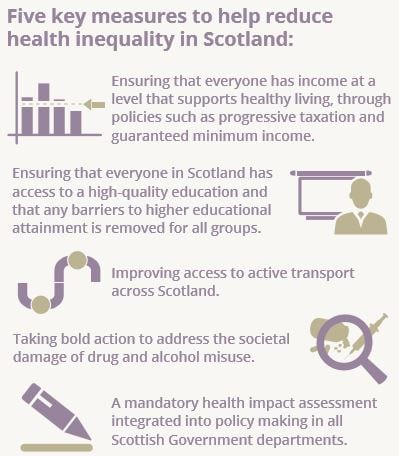Action to address health inequalities in a post-COVID UK
19 Feb 2021
One year on from the outset of the COVID-19 pandemic, understanding how we address health inequalities has become vital in the fight to halt this virulent coronavirus.

Action to address health inequalities has moved up the social and political agenda across the UK as the current COVID-19 pandemic continues, as explained this in the latest edition of our membership magazine VOICE. A copy of this is below and College Members can read the full magazine by logging in.
One year on from the outset of the COVID-19 pandemic, understanding how we address health inequalities has become vital in the fight to halt this virulent coronavirus. Speaking at a College webinar in the autumn of 2020, Professor Jason Leitch put the situation in stark terms. “Your principal protection against COVID is wealth” said Scotland’s National Clinical Director. “If you have a house in which you can self-isolate, if you have a job that will pay you when you’re off, it is much easier to survive COVID-19 in a healthy and normal way than if you haven’t got those things.”
Research by the National Records of Scotland has already revealed that people who live in the most deprived parts of Scotland are more than twice as likely to die from COVID-19 as those from affluent communities, while Scottish Government analysis has shown that the highest proportion of confirmed COVID-19 cases (24%) was accounted for by those living in the 20% most deprived areas.
In February 2020, you could have been forgiven if you’d missed the publication of the follow up report to the Marmot Report into health inequalities in England, “Health Equity in England: the Marmot Review 10 Years On”. Now In a recent follow-up article, Michael Marmot set out the challenge after a decade of stagnation in this area. He said in the British Medical Journal:
“There is now an urgent need to do things differently. We must build a society based on the principles of social justice; reduce inequalities of income and wealth; and build a wellbeing economy that puts achievement of health and wellbeing, rather than narrow economic goals, at the heart of government strategy. We must build a society that responds to the climate crisis at the same time as achieving greater health equity. “Build Back Better” has become the mantra for what we should aim for post COVID. Important, no doubt, but we also need to Build Back Fairer.”
All this is why the Scottish Academy of Medical Royal Colleges and Facilities has joined together ahead of next year’s Scottish Parliament elections to call on all Scotland’s political parties to take action to end all forms of health inequality.
The Academy, which represents the collective clinical and professional views of all of Scotland’s medical professions, highlighted the likely lasting health impact of COVID-19 on Scotland’s poorest households, the elderly and those living with disabilities in its election manifesto, which was published in December 2020. At the publication of the document, Dr Miles Mack, Chair of the Scottish Academy, stated that the impacts of these inequalities could be devastating unless mitigating action is taken by politicians.
“This has been a challenging year for healthcare services and staff in Scotland, as it has been around the world. The impact of coronavirus has been felt by us all. However, there is emerging evidence that the pandemic has disproportionately impacted people in Scotland’s most deprived communities.
“The Scottish Academy believes that urgent work must be undertaken to mitigate this, including policies to reduce the impact of the social determinants of ill health. That’s why the Scottish Academy has proposed five key measures in its election manifesto which could help reduce health inequality in Scotland.

The Academy also believes that access to the NHS in Scotland can be improved by investing in digital resources, particularly for the most isolated in society, such as the elderly and those who live in remote and rural areas.
Although this document is aimed at politicians ahead of this year’s elections in Scotland, the principles apply across the UK and beyond. It’s this fact that lies behind our College’s decision to join a new coalition of nearly 80 organisations which was launched in the second half of 2020 to press the UK government for urgent action to address health inequalities.
The Inequalities in Health Alliance (IHA), which is made up from a range of health organisations from across the UK, has demanded a cross-government strategy to reduce health inequalities: unfair and avoidable differences in health across the population, and between different groups within society. As research commissioned to mark the campaign showed, this approach is supported by the public across the United Kingdom.
Almost two thirds (65%) of those surveyed by Yonder felt that governments across the UK should be doing to more to address the issue and 81% agreed (52% strongly) that there should be a UK government strategy to reduce inequalities in health. There are many causes of health inequalities but deprivation is a key factor. Of those surveyed, 78% agreed (50% strongly) that all parts of Government in each part of the UK should have to consider the impact of their policies on people who are less well off. Three quarters (75%) were concerned – 35% very concerned – that the health gap between wealthy and deprived areas is growing (Health Equity in England: the Marmot review 10 years on, January 2020). Nearly a quarter (24%) selected access to healthcare as the health inequality they were most concerned about, with 17% opting for poor mental health and 16% long term health conditions.
Speaking at the launch of the Alliance, College President Professor Jackie Taylor said: “It’s never been more vital for those of us who work within the NHS to highlight the health inequality crisis that we face. Each day the current COVID-19 pandemic is exacerbating the health gaps between rich and poor and across ethnic groups. We must all work together to take action to address this now. “Our public health depends on our ability to ensure that everyone in our society has the best possible start in life, no matter their background.
We know from our members’ extensive medical experience that poverty is a key determinant of children’s health both now and in their future. We are at a pivotal moment in our nation’s health. Over the long-term, a more equal society will improve public health and reduce the pressures on our health service. I look forward to our College playing its full part in this partnership in the weeks and months ahead.”
As the UK joins with other countries around the world to attempt to “Build Back Better” in 2021 we’ll be continuing our work to highlight this issue and propose positive, progressive policies to those in power.
Category: Equality, Diversity and Inclusion
Latest news and statements
Key priority areas
Topics
- Workforce
- Wellbeing
- Equality, Diversity and Inclusion
- Climate Change
- Health Inequalities
- College
- Obesity
- COVID-19
Archive
Key links
Tweets by @rcpsglasgow